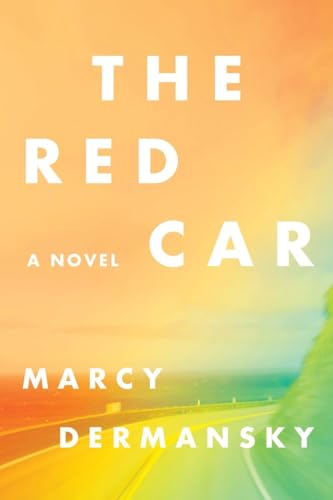
The Red Car, a new novel by Marcy Dermansky, comes with a blurb from Roxane Gay, “I want to eat this book or sew it to my skin or something.” As a reviewer, I feel that endorsement alone means my job is done. You should read The Red Car because you will love it. And then you might want to eat it.

 But maybe you need convincing? That could only be the case if you haven’t heard of Dermansky’s previous novels, the darkly honest Twins or the wickedly twisted Bad Marie. Anyone who has read them will be tempted to lick the cover of her newest at the very least.
But maybe you need convincing? That could only be the case if you haven’t heard of Dermansky’s previous novels, the darkly honest Twins or the wickedly twisted Bad Marie. Anyone who has read them will be tempted to lick the cover of her newest at the very least.
The Red Car tells the story of Leah. In her early thirties, she has an apartment in Queens, a husband named Hans, and a part-time job that allows her enough time to finish a novel. But none of it feels right. When her old boss Judy dies, Leah goes to her revisit her old life in San Francisco where she inherits Judy’s most prized possession, a red sports car. What follows is a sort of road trip, except that Leah is a terrible driver. She drinks, has random encounters, writes, and stumbles her way through the Bay Area in search of her true self. If a story of a woman going west to find herself doesn’t sound original, it’s Dermansky’s delivery that makes this short novel perfectly delectable.
As background: Alan Watts was a British philosopher who first gained popularity in California in the 1960s by expounding a mishmash of Zen Buddhaism, semantics, and musings on nature. He’s now commonly found as voice on YouTube set to Terrence Malick clips, but I’ve been listening to his older recordings. One that caught my attention was his take on the brains.
To Watts, we are as successful as human beings because we let our incredible brains do most of the work for us. They take charge of growing babies, make the heart beat, and heal wounds without any conscious input. Our brains are so much more intelligent than we are that we don’t even understand how they work. But who, then, do I mean by “we”? Instead of identifying with our big brains, we identify “I” with a small slice of our conscious attention. I think of that part of my mind, my “self” as a small narrator who runs the commentary of my life. But, is there any self there? When I die, I won’t leave a self behind. I can’t look through a microscope and see my self. The idea that we should or could be a consistent person when our cells and circumstances regenerate everyday is fiction. There is only a story we tell ourselves.
So when Leah sets out on a road trip in search of herself, how will she find what isn’t there? Dermansky cracks her character open and lets the runny yolk of Leah’s life spill over the pages. The results are highly entertaining. Rather than confused or scattered, Leah is lonely. Like everyone else I know, she is inconsistent and haphazard as she grapples for a story arc that will help her life make sense.
When Leah listens to her sort-of boyfriend reading a dirty passage of Henry Miller in a taqueria, she acknowledges that someday, “I would be old and that I would be mortified at myself, for allowing this to happen.” During a shopping trip at Macy’s she isn’t only trying on a dress, she attempts to slip into a new skin, “I felt like an alternate version of myself and this was the person I would be.”
Judy, the dead boss, becomes another voice in Leah’s head. But Leah doesn’t believe in ghosts and knows that she is only talking to herself. That doesn’t stop her from taking Judy’s good advice: “you shouldn’t always believe the things you tell yourself.” In what I found the most relatable passage about Lulu Lemon-style yoga ever written, Leah fails to do a headstand, “I was watching woman more beautiful than I was, stretching more deeply than me. And while I had these inappropriate competitive thoughts during a nonjudgmental yoga class, I judged myself for my thoughts.”
Dermansky seems to write without censure. She hasn’t tried to level Leah’s lack of a consistent self by rolling a forced order over her character. Maybe Dermansky didn’t buckle when an editor asked, “but does Leah’s next move make sense?” and perhaps she didn’t bend when a reader questioned Leah’s motivation. When a character is on a quest to find a true self, the discovery at the end can often feel lifeless. The Red Car pulses, as it gives a twist to the road trip genre. Leah doesn’t find herself, she comes to understand the many people she can be.
Leah is funny and insightful and a mess and fantastic. You’ll want this story to seep inside your skin. One reading of The Red Car should do, but the relationship could be more permanent. You may want to follow Roxane Gay’s impulse and eat a few pages. They will become a wet wad in your stomach and some of the ink will leech into your blood stream. The Red Car will become part of you. And you will feel less alone.








